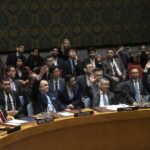
Discussions between the Ministry for Education and Employment (MEDE) and the Malta Union of Teachers (MUT) are currently underway to employ foreign teachers in specific subjects, Education Minister Evarist Bartolo told The Malta Independent on Sunday.
A ‘crisis’ resulting from a shortage of teachers has persisted for several years, with directives being issued and a recent altercation resulting between the MEDE and the MUT about mathematics and Maltese exams, due to the lack of teachers available to teach the subjects.
When asked if foreign teachers will be employed to tackle this long-standing shortage, Bartolo said that as foreign teachers are already employed in independent and church schools, “where there is felt the need only,” foreign teachers could also be employed in state schools.
The subjects highlighted by the minister that could be taught by foreign teachers include mathematics and information technology. The MUT had previously highlighted that the problem of staff shortages primarily persists in three core subjects: Maltese, English and mathematics.
When asked how many foreign teachers are required, the minister replied that they cannot know at this point. He did, however, compare the employment of foreign teachers to the health sector whereby he said that foreign nurses and doctors were employed to alleviate the workload.
The minister said that the number of people requiring the service has increased and since there were not enough Maltese teachers, an issue which is apparent in all work sectors, then discussions to employ foreign teachers for specific subjects where there is a shortage need to ensue.
“The teachers will have a lighter workload and fewer lessons, and we can work for the benefit of the Maltese teachers,” Bartolo said. He also emphasised that in every case, Maltese teachers will be the first to be recruited.
When asked what prerequisites the foreign teachers will require, the minister said that they cannot have fewer prerequisites than Maltese teachers but reiterated that discussions are still underway. They will not become ‘regular’ teachers straight away, he added, and said they will be obliged to learn Maltese over several years.
“What we are asking is already more than is required in independent and church schools,” Bartolo noted. “Since they will be working in Maltese schools, they are obliged to learn Maltese,” he added.
Other measures to tackle teacher shortages are being discussed not only with the MUT, but also with the finance ministry, Bartolo said. Discussions on how recruitments are made in the public sector are also taking place.
Such discussions are taking place to be able to recruit more teachers, the minister said, adding that Malta is only now facing the issue of teacher shortages. “It is not a consolation for us that in other countries the situation is worse because we need to take care of our country for the years to come.”
One of the advantages Malta has, Bartolo noted, is that the average age of our teachers is much lower than that of other countries. The struggle for other EU countries is that they are not able to attract more teachers to the profession but at the same time the current cohort of teachers has a higher average age than those in Malta.
“There is the impression that teachers are resigning en-masse [in Malta] but this is not the case,” the Minister said. Although not a consolation, in other countries, three per cent or more of the cohort of teachers are resigning, while in Malta it is around one per cent, for various reasons.
Bartolo said that it remains a big challenge to attract more youths to the profession and an even bigger challenge for those offering the courses for youths to become teachers. “There is a big responsibility for the Faculty of Education to ensure the programmes it offers are attractive and that youths enjoy doing them.”
The courses should not only be attractive for youths but should accommodate those whose time availabilities differ. Furthermore, the courses should not be done in the same ways just because it has always been done so, the minister insisted.
“Realities change and it is our responsibility, and by that I mean MCAST, the Faculty of Education, the Institute for Education, as well as the private sector which offers programmes,” he said. The programmes offered need to be ‘serious’ and prepare teachers well for the big challenges they will face.
“It is not easy being a teacher, there are big challenges,” the minister said. The programmes cannot be only about education and the philosophy and sociology of education, he continued, but should also be about pedagogy.
This means the courses should include how to teach and how to face challenges like the changes adolescents face, adolescents from different countries, students from different backgrounds and how to offer education programmes that keep students interested.
“Of course the teachers should not be left alone, but should receive support from us and those managing the schools,” Bartolo ended.
MUT replies
When asked by this newsroom if there were ongoing discussions between the government and the MUT about the recruitment of foreign teachers, its president, Marco Bonnici, said that “discussions on ways to recruit more teachers in specific subjects have been ongoing with the Ministry for Education and Employment (MEDE) for months and the proposal has been tabled by the ministry. To date, there have not been any new developments.”
The MUT was also asked about the stage of the discussions and further details about such recruitment, as well as their stand on the matter. The MUT did not reply to these questions.







